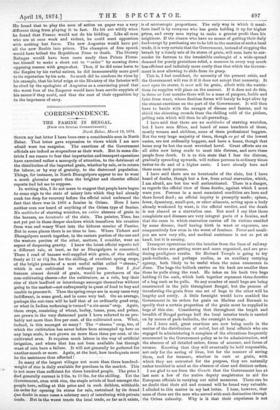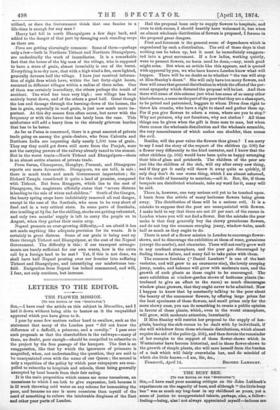CORRESPONDENCE.
THE FAMINE IN BENGAL.
[FROM OUR SPECIAL CORRESPONDENT.]
North Behar, March 19, 1874. :SINCE my last letter I have been over a considerable area in North Behar. That letter gave expression to views which I am now afraid were too sanguine. The exertions of the Government officials are indeed as stupendous as their work. But in some dis- tricts I see reason to fear that importation and transport operations have exercised rather a monopoly of attention, to the detriment of the distribution of the imported grain, whether by sale, or in return for labour, or by way of gratuity, to the distressed population. Things, for instance, in North Bhaugulpore appear to me to wear a much gloomier aspect than the brighter and cheerier official reports had led me to suppose.
In writing this, I do not mean to suggest that people have begun to come nigh to the state of misery into which they had already sunk too deep for recovery before the official mind embraced the fact that there was in 1866 a famine in Orissa. Here I have neither seen nor heard of anything of the Orissa type of famine. No multitudes of starving wretches, no entire absence of grain in the bazaars, no hecatombs of the slain. The painter, Time, has not yet put in those deeper shadows which transform his creation from wan and weary Want into the hideous maniac of Famine. But in some places there is no time to lose. Where Tirhoot and Bhaugulpore march together, in the eastern portion of the one and the western portion of the other, matters, I consider, wear an aspect of deepening gravity. I know the latest official reports tell a different tale, at least, as far as Bhaugulpore is concerned. There I read of bazaars well-supplied with grain, of rice selling freely at 11 or 11i lbs. for the shilling, of excellent spring crops, of the bright promise of a most useful millet called " cheena," which is not cultivated in ordinary years. But I find bazaars almost devoid of grain, would-be purchasers of the non-cultivating classes—for the cultivators, as a rule, buy their rice of their landlord or interchange amongst themselves without going to the market—not unfrequently in quest of food to buy and unable to procure it. Then the spring crops are in many cases very indifferent, in some good, and in some very bad. On an average, perhaps the out-turn will be half that of an ordinarily good crop, or what in Indian reckoning is termed "a six-anna" crop. Again, these crops, consisting of wheat, barley, beans, peas, and pulses, are grown in the very distressed parts I have referred to on pro- bably not more than five per cent. of the cultivated area. What, -indeed, is this amongst so many ? The " cheena " crop, too, of which the cultivation has never before been attempted up here on any large scale, is not grown on more than three per cent, of the -cultivated area. It requires much labour in the way of artificial irrigation, and where that has not been available has through want of rain been a failure. It will not generally be gathered for another month or more. Again, at the best, how inadequate must be the assistance thus afforded !
In many of the largest villages not more than three hundred- weight of rice is daily available for purchase in the market. This is not more than sufficient for three hundred people. The price I find generally current is 9 lbs. to 10 lbs. for the shilling. Yet the -Government, even with rice, the staple article of food amongst the people here, selling at this price and in such driblets, withholds its order for opening its stores for sale, restrained by its dread This is, I feel confident, the necessity of the present crisis, and the Government will rue it if it does not accept that necessity. It must open its stores, it must sell its grain, albeit with the restric- tions its supplies will place on the amount. If it does not do this, in three or four months there will be a mass of paupers, feeble and faint from want, whose fleshless forms will barely be kept alive by the utmost exertions on the part of the Government. It will then have to battle with the ravages of disease and famine, and to shield the shivering crowds from the chilling cold of the pitiless, pelting rain which will then be all-pervading. I have said that there are no multitudes of starving wretches, but I have seen fifties, and heard of some hundreds of these, mostly women and children, some of them professional beggars. But the very large majority of them, though as yet of the lowest castes, are not ordinarily beggars, and have a home, though that home may be but the most wretched hovel. Great efforts are on all sides now being made to meet this distress, and save these people from death. It is to this state that I fear the distress, gradually spreading upwards, will reduce persons in ordinary times better-to-do and of a higher caste. I have already here and there seen such persons. I have said there are no hecatombs of the slain, but I have heard of deaths, though but a few, from actual starvation, which, I am afraid, are but too well authenticated. There is a danger, as regards the official view of these deaths, against which I must warn you. Persons in a most emaciated condition are here and there found dead ; an official inquiry is promptly made ; spleen, fever, dysentery, small-pox, or other ailments, acting upon a body already weakened by want, is the official verdict, and the death is not classed as a starvation one. But need I say that these complaints and diseases are very integral parts of a famine, and that the cases in which starvation carries off its victims unaided by some disease, itself having birth in want or exposure, are comparatively few even in the worst of famines. Fever and small- pox are now very rife, and medical assistance is not as yet at hand, but it is coming. Transport operations into the interior from the lines of railway and the rivers are getting more and more organised, and are pro- ducing prodigious results. Sir Richard Temple is going to try pack-bullocks, and perhaps coolies, as an auxiliary carrying agency, both likely to be useful when the rains commence in June. The bags the bullock carries on his back are smaller than those he pulls along the road. He takes on his back two bags holding 61 lbs. each, which both together represent three-fourths of a bag such as he pulls. So any number of small bags are being constructed in the jails throughout Bengal, but the process of transferring the grain from one set of bags to the other will be lengthy and costly. A little foresight would have enabled the Government in its orders for grain on Madras and Burmah to specify that a certain proportion of the grain must be supplied in bags of this size. Considering that throughout the length and breadth of Bengal perhaps half the local interior trade is carried on by means of pack-bullocks, the oversight is strange. As I have said, great exertions are now being made in the matter of the distribution of relief, but all local officials who are engaged in administering it complain of the alterations frequently announced in the Government policy as to its administration, and the absence of all detailed orders, forms of account, and forms of returns. Knowing that they will eventually be held responsible, not only for the saving of lives, but for the manner of saving them, and for treasure, whether in cash or grain, with which they are entrusted for the purpose, they are naturally rather troubled in mind at the absence of clear and distinct orders. I am glad to see from the Gazette that the Government has at last sent a few of the native deputy magistrates to aid the European officials in carrying out relief measures. There can be no doubt that their aid and counsel will be found very valuable. I alluded to this matter in my last letter. I hear, however, that none of these are the men who served with such distinction through the Orissa calamity. Why is it that their experience is not utilised, or does the Government think that one famine in a life-time is enough for any man ? Heavy hail fell in north Bhaugulpore a few days back, and added to the danger of that part by damaging such standing crops as there are. Fires are getting alarmingly common: Some of them—perhaps only a few—both in Northern Tirhoot and Northern Bhaugulpore, are undoubtedly the work of incendiaries. It is a remarkable fact that the house of the big man of the village, who is supposed to have a store of grain, almost invariably is one of the burnt. Everything is so dry now, that with a high wind a fire, once lighted, generally devours half the village. I have just received informa- tion of eight fires which have, within the last forty-eight hours, occurred in different villages within a radius of three miles. One of them was certainly incendiary, the others perhaps the result of accident. The wind has been very high ; one village has been entirely burnt down, and of the others a good half. Great though the loss and damage through the burning-down of the houses, the loss in grain, especially in seed grain, is just now much more im- portant. At this dry season fires often occur, but never with the frequency or with the havoc that has lately been the case. This misfortune will add a heavy item to the already grievous burden that has to be borne. As far as Patna is concerned, there is a great amount of private trade going on among the grain-dealers, who from Calcutta and Northern India are importing daily nearly 1,500 tons of grain. They say they could get down still more from the Punjab, were not the carrying powers of the railway already taxed to the utmost. But in the worst tracts—North Tirhoot and Bhaugulpore—there is an almost entire absence of private trade. From Sarun, Chumparun, Monghyr, Purneah, and Dinagepore reports are more favourable. Dinagepore, we are told, is safe ; there is much trade and much Government importation ; Sir Richard Temple considered it quite a land of promise, compared with Tirhoot. But from Rungpore, which lies to the east of Dinagepore, the magistrate officially states that "severe distress is leading to the sale of wives and children." South of the Ganges, the heavy spring crops have indubitably removed all real danger, except in the case of the Sonthals, who seem to be very short of food and in a very critical state. In some parts of Sonthalia, rice is selling at 8f lbs. for the shilling, stocks are getting exhausted, and only two months' supply is left to carry the people on to August, when they gather their maize crop. Nepaul presents an ever-growing difficulty,—I am afraid it has not made anything like adequate provision for its wants. It is certainly in great distress. Some of our grain is being sent up there through Tirhoot and Bhaugulpoor, at the cost of the Nepaul Government. The difficulty is this : if our transport arrange- ments are barely sufficient for our own wants, how is the extra call by a foreign land to be met ? Yet, if this is not done, we shall have half Nepaul pouring over our frontier into suffering Tirhoot and Bhaugulpore, and intensifying our misfortunes ten- fold. Emigration from Nepaul has indeed commenced, and will, I fear, not only continue, but increase.



































 Previous page
Previous page